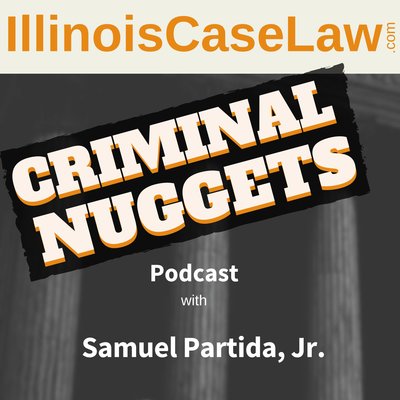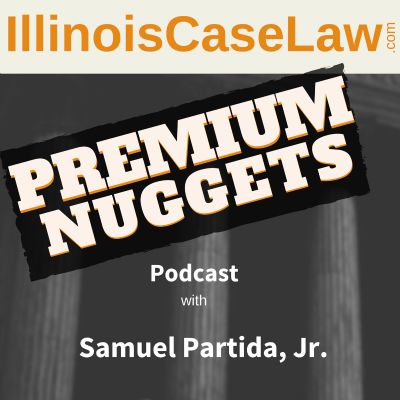Jul 15, 2016
Sometimes the defense can gather up pretty convincing evidence
of police misconduct, and the trial judge just can't pull the
trigger on doing the right thing. Episode
198 (Duration 16:04)
See People v. Montanez, 2016 IL App (1st)
133726 (June) and
People v. Serrano, 2016 IL App (1st)
133493 (June).

[powerpress] Subscribe: iTunes | Android | RSS
Trial court's granting of the State's motion for directed verdict after the defendant's testimony in this third stage hearing was reversed.
The reviewing court said any other result would work a palpable injustice.
The Petition
This petition involves a murder 22 years ago. This was a shooting.
The entire petition relied on a snitch who recanted and other state witnesses who subsequently recanted.
The Snitch
The state's witness who said the defendant's confessed to him completed an affidavit in which he recanted his trial testimony. He averred that his testimony at trial was “false in all respects.”
Going point by point, attested that the testimony he gave was supplied to him entirely by Detective Guevara and that he agreed to give the testimony as a result of threats, physical coercion, and promises of leniency for his own crimes.
The witness accepted 9 years when he was eligible for 100.
He was also given money and received special treatment in prison in
return for supplying false information in this case and in others
at the behest of Guevara.
The Eyewitnesses
Defendant and his codefendant filed a statement from another eyewitness who never testified at trial but testified before the grand jury. This witness also recanted his supposed eyewitness testimony offered during the investigation and to the grand jury.
Affidavits or other forms of sworn statements from at least 10 different witnesses swearing that Guevara had abused them or coerced them into giving false testimony were also obtained.
At the evidentiary hearing, Detective Guevara invoked his fifth amendment right, refusing to answer on grounds that he might incriminate himself. Similarly, the state's informant invoked the fifth amendment and refused to give testimony to back up his sworn recantation. There were several indications that he feared prosecution for having previously perjured himself at defendant's’ trial.
The allegations against the police were that they beat the witnesses and gave them photos and reports to "study".
Coerced Confession
One of the defendant's in this case said the detective beat him into a confession and threatened to beat his wife if he didn't confess. Other witnesses testified to similar police misconduct. One witness said he was punched so hard by the detective he suffered permanent hearing loss and confessed to a murder he did not commit.
The trial court barred the testimony of 12 other individuals who would have averred that they were abused or otherwise witnessed misconduct by Guevara. The trial court’s reasoning for not allowing the evidence was that the testimony was too temporally remote or not similar enough to the allegations in this case.
The Victim's Wife
The victim's own wife was barred from testifying at the third stage hearing.
She would have testified that she was unable to identify a vehicle when she drove with the detectives, but that Guevara took her to the location of the vehicle and told her that it was the car from the gas station. It was him, not her, who identified the vehicle.
She would have also testified that Guevara falsely told her that some bullet holes in the subject car matched the ballistic testing done at the scene of her husband’s murder when they, in fact, did not.
Trial Judge Ruling
The trial judge denied the petition claiming the defendant failed to prove his case that the the witnesses were coerced into testifying falsely.
Because the trial judge dismissed after a directed motion by the state, the question here is: has the petitioner made a prima facie showing that the new evidence presented, taken in a light most favorable to him, would probably change the result if the case was retried?
At trial, the only direct evidence of petitioner’s guilt was the informant's testimony. The informant supplied what amounted to a confession from defendants including details of the crime that swayed the fact finder. The trial judge commented, “were it not for the testimony of [the informant], there wouldn’t have been much evidence here. His testimony is crucial.”
That “crucial” testimony is now entirely repudiated in a sworn statement by the person who gave it.
The witness now claims the testimony was “false in all respects.” Detail by detail the informant averred that the testimony he gave at trial was fed to him by Guevara, was coerced, and was not true.
Analysis
Although, recantations should be viewed skeptically, this one contained significant additional corroboration. The postpetition trial judge stated that “the evidence in the present case so overwhelmingly favors the State that no contrary verdict based on that evidence could ever stand.” The reviewing court profoundly disagreed. The reviewing court was not so dismissive of the petitioner's witnesses.
“In our view, any allegation that Guevara coerced a person to provide evidence is relevant to whether defendants in the case at bar were similarly coerced.” For the trial court to find all of that evidence totally unworthy of any credit when it was required to view the evidence in a light most favorable to petitioner is truly puzzling. At this stage in the proceedings, petitioner was required to make out merely a prima facie case that would cause the court to view the “evidence presented at trial in a different light and undercut the court’s confidence in the factual correctness of the guilty verdict.”
That has clearly occurred here.
When all of the postconviction evidence is viewed in a light most favorable to petitioner, the trial court was wrong to say that no contrary ruling could ever stand. The trial court turned a blind eye to much of the evidence and also refused to admit probative, admissible evidence that, when evaluated under the proper standard, is damning.
Even where the court gave lip service to the standard it was supposed to apply, the court clearly did not adhere to that standard.
The postconviction court gave the impression that it was flatly unwilling to consider the evidence offered by petitioner. Therefore, in the exercise of discretion under the supreme court rules, the reviewing court found that the interests of justice would be best and most efficiently served by the case being assigned to a different judge on remand.The directed finding in favor of the State is vacated. The case is remanded to the presiding judge of the criminal division of the circuit court with instructions that the case be assigned to a different judge to adjudicate the reinstated third-stage postconviction proceedings.



